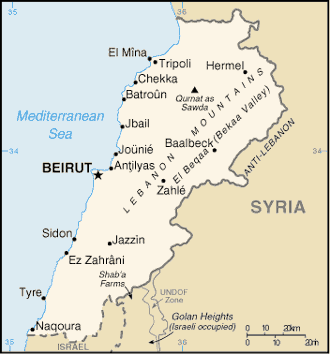Map:

Overview:
Lebanon has made progress toward rebuilding its political institutions since 1991 and the end of the devastating 15-year civil war. Under the Ta'if Accord - the blueprint for national reconciliation - the Lebanese have established a more equitable political system, particularly by giving Muslims a greater say in the political process while institutionalizing sectarian divisions in the government. Since the end of the war, the Lebanese have conducted several successful elections, most of the militias have been weakened or disbanded, and the Lebanese Armed Forces (LAF) have extended central government authority over about two-thirds of the country. Hizballah, a radical Shia organization, retains its weapons. During Lebanon's civil war, the Arab League legitimized in the Ta'if Accord Syria's troop deployment, numbering about 16,000 based mainly east of Beirut and in the Bekaa Valley. Damascus justifies its continued military presence in Lebanon by citing Beirut's requests and the failure of the Lebanese Government to implement all of the constitutional reforms in the Ta'if Accord. Israel's withdrawal from southern Lebanon in May 2000, however, encouraged some Lebanese groups to demand that Syria withdraw its forces as well. The passage of UNSCR 1559 in early October 2004 - a resolution calling for Syria to withdraw from Lebanon and end its interference in Lebanese affairs - further emboldened Lebanese groups opposed to Syria's presence in Lebanon.
The People:
Population: 3,826,018 (July 2005 est.)
Age structure:
0-14 years: 26.7% (male 520,270/female 499,609)
15-64 years: 66.4% (male 1,216,738/female 1,324,031)
65 years and over: 6.9% (male 120,176/female 145,194) (2005 est.)
Religions:
Muslim 59.7% (Shi'a, Sunni, Druze, Isma'ilite, Alawite or Nusayri), Christian 39% (Maronite Catholic, Melkite Catholic, Armenian Orthodox, Syrian Catholic, Armenian Catholic, Roman Catholic, Protestant), other 1.3%
note: seventeen religious sects recognized
Government Type:
republic
Leader(s) to pray for:
chief of state: President Emile LAHUD (since 24 November 1998)
head of government: Prime Minister Fuad SINIORA (since 30 June 2005); Deputy Prime Minister Elias MURR (since April 2005)
Source: The World Factbook
View All Countries